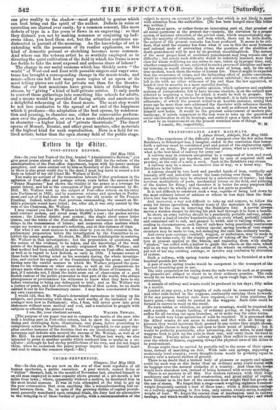Ittttro to tie c��itnr.
POST-OFFICE REFORM.
22d May 1855.
Sin—In your last Topic of the Day, headed "Administrative Reform," you give great praise almost solely to Mr. Rowland Hill for the reform of the administration of the Post-office department, begun with his penny-postage pamphlet, and since carried out by him as Secretary of the Post-office. But as there is also great credit due to the dead, I must beg leave to record a few facts on behalf of my old friend Mr. Wallace of Kelly.
You make no account of the tremendous labours of that gentleman in the agitation of Post-office and postage reform years before the success of the "Penny Magazine" had shown the vitality of the penny as a leverage for ppoosstal reform, and led to the conception of that grand development by Mr. Mr. Wallace took up the subject of Post-office reform on his entry into Parliament in 1833; and by numerous returns and speeches in Parlia- ment and out of it had done much to upset the old system of Sir Francis Freeling. Indeed, without that previous cannonading, the assault on Mr. Hill's principle would have failed; for, after all, it was only carried by the vote of the Chairman, Mr. Wallace. I may remind you that Mr. Wallace in his early labours had overhauled the mail contract system, and saved some 30,0001. a year ; the packet service system ; the Landon district post system ; the single sheet ounce letter system, and the tricks of the Post-office to deteot enclosures in letters; the delays in the tranarniasion of letters; and numerous other matters which escape my memory at a moment's reflection, and at. this distance of time.
But what I am most anxious to make clear to you on this occasion is, the preliminary preparation before the investigation by the Committee to es- tablish the penny-postage. No doubt, Mr. Hill was indefatigable in assisting Mr. Wallace in that investigation; but the preparation of questions, and the nature of the evidence to be taken, and the knowledge of the weak points of the department, all or mostly originated with Mr. Wallace ; and that method had been exhibited in previous inquiries on Post-office matters, as well as in regard to Law Reform, so early as 1834. I became aware of these facts from having acted as his secretary during the whole investiga- tion, and carried the reports of the Committee through the press; and from having seen the careful manner in which Mr. Wallace prepared the ques- tions for his witnesses on other occasions, as well as the preparations he always made when about to open a set debate in the House of Commons. In fact, if I mistake not, I think the habit arose out of observation of a good Scotch custom of the public prosecutor in that part of the world, who always precognosces or preixamines his witnesses to know what they have to any before venturing to bring any delinquent to trial; and as Mr. Wallace was a justice of peace, and had observed the benefits of that system, he no doubt carried it out in his Parliamentary career. I may have corroborated it from my own experience.
I would add, that Mr. Wallace's determined earnestness in taking up his subject; and persevering with them, is well worthy of the imitation of the younger men now in Parliament; who, I fear, will never grow into great statesmen without more method and zeal, and a resolution to grapple with subjects as affecting the general weal. I am, Sir, your obedient servant, WALTER NEWALL.
[The purpose of our paper was not to compare the merits of the men who took a leading part in Post-office reform, but to show the necessity of de- fining and developing facts, illustration; and plans, before proceeding to compulsory action in Parliament. Mr. Newell's appendix to our paper sup- plies another instance of the doctrine that we are inculcating: careful per- severance and definite aim secured the success of Mr. Wallace, as well as of Mr. Hill. In our parenthetical allusion to Mr. Wallace last week, we also intended to point to another quality.which rendered him so useful as a co- adjutor: although he had strong-predilections of his own, and did not forget them, when he undertook the penny postae inquiry he set himself heart and soul to attain the common object.—En..]]


































 Previous page
Previous page